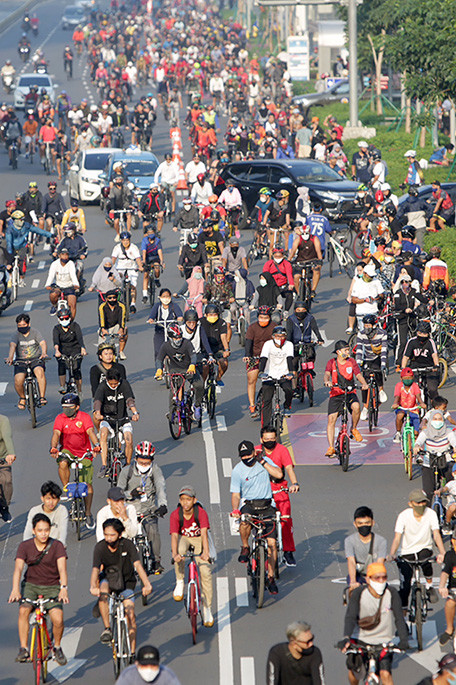Popular Reads
Top Results
Can't find what you're looking for?
View all search resultsPopular Reads
Top Results
Can't find what you're looking for?
View all search resultsImport rules tightened on sought-aft er bicycles, shoes
Newly issued Trade Ministerial Regulation 68/2020, which took effect on Aug. 28, requires businesses to obtain import approval (PI) for the imports of bicycles, footwear and ACs.
Change text size
Gift Premium Articles
to Anyone
T
he government has tightened import rules on consumer goods that are in high demand during the pandemic, while experts warn about the readiness of local manufacturers to provide sufficient supply.
Newly issued Trade Ministerial Regulation 68/2020, which took effect on Aug. 28, requires businesses to obtain import approval (PI) for the imports of bicycles, footwear and ACs.
As there was no previous trade regulation on bicycles import, importers of footwear and AC only had to provide a surveyor’s report (LS).
The monitoring mechanism will now take place within the customs area or post-border. There are also specific points of entry allowed to import the goods for land, air and sea transport, including Tanjung Priok Port in North Jakarta and Soekarno-Hatta International Airport in Tangerang, Banten.
The new rule came as the demand for bicycles surged during the pandemic, as people use bicycles to commute and for exercise amid the loosening of social restrictions. The import value for bicycles rose by 24.8 percent year-on-year (yoy) in the first half of 2020 to US$39 million, according to the Indonesian Association of Bicycle Companies (Apsindo), citing Statistics Indonesia (BPS) data.
Apsindo chairman Eko Wibowo Utomo said on Tuesday that while the regulation might benefit local industries, the tighter import regulation may limit supply of bicycles at a time when demand is high and, therefore, cause a shortage.
“For the past month, distributors and importers are forced to survive as their supplies are dwindling,” Eko told The Jakarta Post in a phone interview. “With supply falling while the demand is still high, prices will soar.”
With local manufacturers failing to meet consumer demand, a local bicycle could sell for up to Rp 11 million ($743.44), higher by around 46 percent of its retail price, according to Eko.
So far, Indonesian bicycle importers mostly source their products from China, trailed by Taiwan, the United Kingdom, Singapore and the United States, Apsindo data shows.
On Aug. 30, Trade Minister Agus Suparmanto cited the increase in imports of consumer goods by 50.64 percent in May and June as the reason behind the stricter import regulation, even though from January to July, consumer goods imports were down by 7.15 percent yoy to $8.29 billion, BPS data shows.
Overall, Indonesian imports were down by 17.17 percent yoy to $81.37 billion in January-July from the same period last year, amid slowing manufacturing activities and the disruption on global trade due to the pandemic. A majority of the country’s imports are raw materials or intermediate goods.
Meanwhile, between 2018 and 2019, Indonesia’s imports of textile footwear were up by 27.87 percent to $275.98 million, while AC imports increased by 10.92 percent to $670.60 million, according to data from the United Nations International Trade Statistics Database (UN Comtrade).
Firman Bakri, the executive director of the Indonesian Footwear Association (Aprisindo), said on Monday that his association was still discussing the impact of the new regulation.
“In five years, there were nine changes. So, we need to look at the changes one by one in detail to see the updates in the new regulation,” Firman told the Post via text message.
Meanwhile, Mohammad Faisal, executive director of the Center of Reform on Economics (CORE) Indonesia, said the government should put the import restrictions in place only until local industries were competitive enough to meet the demand for the products.
Faisal said the new regulation followed the global tendency toward a more inward-looking trade policy, which allows local businesses — especially electronics and bicycle manufacturers — to sell their products to more customers.
“It is reasonable as long as it is followed by a supporting policy aimed at encouraging domestic industries to increase their production capacity to meet the rise in demand,” Faisal said in a phone interview on Monday.
Although it is difficult to curb such imports in the short run, Indonesia should be well-prepared to face the oversupply of imported products, especially in the electronics and textile industries, according to Enny Sri Hartati, an economist at the Institute for Development of Economics and Finance (Indef).
“We actually can have the import substitutes [for electronics and textile],” Enny said in a phone interview on Tuesday. “Or, at least, we can invite investors to develop their factories here, especially those producing electronic goods, because we have a big market.”










